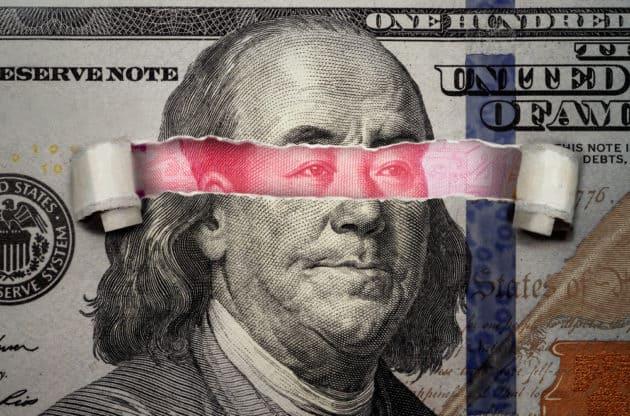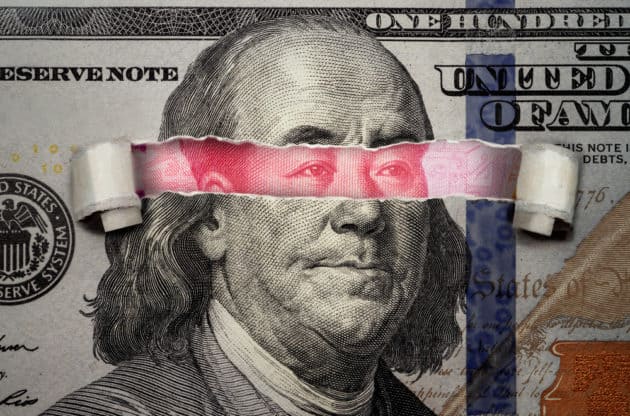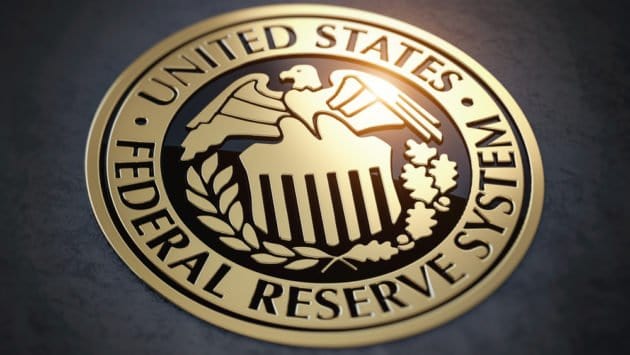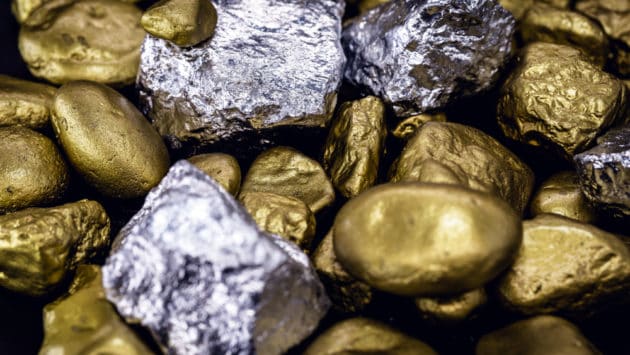
“From everyone who has been given much, much will be demanded; and from the one who has been entrusted with much, much more will be asked.” (Luke 12:48)
With great power comes great responsibility
The power to control and manage the US dollar, the world’s reserve currency, is a great power, but with it comes great responsibility and care.
This is not a principle stated by the weak, asking the ruler to be cautious with his power. This is a guiding lesson for the strong, reminding him that if he will not exercise care, his great power can and will be taken away.
And this is a lesson the US government has ignored repeatedly. During the last two decades, in addition to its out-of-control deficit spending, our government has been using its dollar hegemony as a weapon, disrupting economies to get what it needs without firing a single bullet. The targets include Cuba, Iran, North Korea, and Venezuela.
We were never able to topple a regime using these methods, yet we still use them. This time around, we went all the way when the Biden administration and the Fed declared a financial war against Russia by using the dollar and SWIFT as weapons. SWIFT is the international payment system led by the US, and it’s responsible for around 88% of cross-border payments worldwide.
Weaponizing the dollar against Russia
Few countries support Russia’s decision to go to war, while there is a great show of support for the Ukrainian people in their cause to fight the invading Russian army.
Many also believe that we, as a democratic country, should support democratic Ukraine in its fight against Putin’s kleptocracy, and they are happy to see that we’re doing just that.
But the weaponization of the dollar’s dominance to extend the reach of our law and policy over the actions of foreign countries is another matter with predictable, unfavorable consequences.
How we weaponized the dollar
The first economic shot we leveled at Russia was the Biden administration’s sanctions and its removal of Russia from SWIFT. But when that on its own proved not to be ironclad, the Fed stepped in (driven most likely by a request from the Biden administration) and froze Russia’s US assets.
Russia no longer has access to the dollars it owns, and its central bank lost access to financial services involving dollars and has no access to the dollars it controlled. Now it cannot meet domestic demand for dollars that importers need to pay their foreign suppliers, and exporters are no longer able to receive revenue in dollars. This cripples Russia.
However, our administration’s and the Fed’s unprecedented economic warfare against Russia is objectionable. Not because it is ineffective or because it hurts Russian interests — as a doomsday weapon, it’s pretty effective in preventing a country from thriving, and we shouldn’t care much for Russian interests. We should care about ours. And that’s exactly why it’s objectionable: Economic warfare could hurt US interests.
Our actions send a message to China
Why is the Fed’s action so wrong? First, the crippling US-led economic sanctions are forcing Russia into China’s arms as its only choice for trade and commerce. Iran and Cuba are surviving our sanctions, but they don’t have what Russia has: surplus grain, oil, and metals and a border with China who is willing to ignore US sanctions. Is it in our interest that the second- and third-largest superpowers in terms of nuclear weapons bond financially? I doubt it.
Second, this move sent a message to China and other non-democratic countries that if they don’t behave, their turn is next.
And if this message was not clear enough on its own, then Beijing will hear Senator Marco Rubio’s rallying cry: He is working on legislation that will impose sanctions on China if it assists Russia by letting it use the Chinese Cross Border International Payment System — its alternative to SWIFT that we cannot control — to evade the brunt of the US financial attack.
How will China respond?
Yes, our administration, the Fed, and Congress are sending a very clear message to China, our biggest competitor with aspirations for world domination: “Hey China! We can and will make your $3.2 trillion reserves worthless overnight if you do something we don’t like, so do as we say!”
So, if you were China, would you hold the dollar as your reserve currency so that a US administration can just freeze it? Or would you decide to dump the greenback to buy gold, which cannot be frozen by a Fed bureaucrat?
And as expected, Saudi Arabia and China have just this week resumed their negotiations to sell Saudi oil for Chinese yuan instead of the dollar. Seems like they are listening to us. What will happen to the value of the dollar if China dumps it?
But it doesn’t end with the dollar. China can see that the US is not hesitating to go to financial war against a nuclear superpower. So, how about stocking up on hard assets the US needs, like silver, copper, or nickel mined by and in China, as well as resources mined in Russia? Will China choose to hoard them and use them as leverage instead of selling them for dollars it can’t trust?
Moving away from the dollar as the world’s reserve currency
There is little doubt and ample historical evidence that the long-term consequences of weaponizing the dollar will hurt our nation and our people by inevitably ending the dollar’s special reserve status — much sooner than we think.
In the short term, this financial warfare may turn into a shooting war nobody wants. Why take this risk? And in the long term, digital assets will no longer be regarded as a safe store of wealth because they can be frozen and therefore will not be trusted by governments, central banks, and individuals.
With this single decision, the administration and the Fed injected risk into the dollar. The probability of a dollar default to its holder is arguably higher now than before. And adding risk to the dollar destabilizes it and moves it further away from being a store of wealth.
The new commodity world order
Countries, central banks, and private citizens want to preserve their purchasing power. If foreign exchange reserves of a specific type (dollars) can be frozen in an instant, the central bank will not hold them. Period. If economic sanctions evolving around a specific currency are crippling, people and states will do everything in their power to avoid exposure to this currency.
We won’t need to search much for a reliable store of wealth. We just need to look back in time. The distrust in fiat currencies that can be frozen will place us on a road to a new commodity world order that in many ways will be like ancient eras we can only read about in history books — eras when ownership of physical assets was the only way to accumulate wealth.
Are central banks getting ready to move away from the dollar?
Instead of holding the weaponized dollar, countries will most likely choose gold, which cannot be frozen or taken away, as an essential store of wealth for preserving purchasing power.
In recent years, several central banks have specifically mentioned how important gold is for their reserve holdings to back up their foreign exchange funds. And the historical, unprecedented rate at which global central banks have acquired gold in recent years shows they back up their words with action.
This is not in the interest of the US, the dollar, or the exorbitant privilege we have by managing the world’s reserve currency. It takes time to move away from a reserve currency, so the dollar’s stronghold on the world won’t end tomorrow or this year. But the history of the British pound, the previous world reserve currency, shows that a few years after it was weaponized by England against its adversaries, its rule ended.
May you be safe in these uncertain times.

Joseph Sherman, CEO
Gold Alliance
The post How Weaponizing the Dollar Will Destabilize It appeared first on Gold Alliance.




